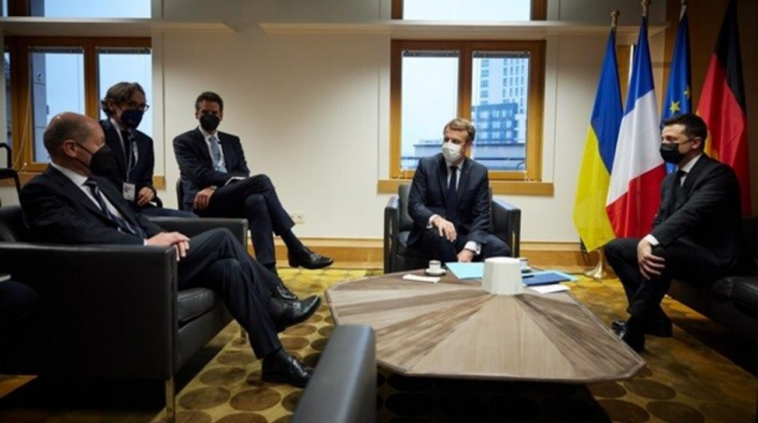This past week, all eyes were on Brussels, where Eastern Partnership countries gathered for a summit, and leaders of Ukraine, France, and Germany (all Normandy Four members but Russia) met. In the face of a threat of Russian invasion, diplomatic efforts in support of Ukraine matter. Here’s what the presidents of Ukraine and France, and the German Chancellor discussed. A few Eastern Partnership countries moved their agenda forward counter to what many would expect of the format. Read on.
Normandy Four meets without one member
On the sidelines of the Eastern Partnership summit in Brussels on December 15, there were a number of key meetings for Ukraine. President Zelenskyi held bilateral meetings with the French President and the German Chancellor. The Ukrainian President also took part in a trilateral meeting with President Macron and Chancellor Scholz. The leaders discussed efforts for peace in Donbas and agreed to proceed in the Normandy format.
Zelenskyi thanked Germany and France for steady support for Ukraine amid the Russian military threat.
Ukraine has no aggressive intentions. Ukraine stages no provocations on the border, and has no plans for aggressive moves against other states, President Zelenskyi underscored during the trilateral meeting. “We expect that Russia will withdraw its troops and materiel from Ukraine border as soon as possible. Despite diplomatic efforts, they remain near our border,” the President said.
Scholz and Macron signaled support for Zelenskyi’s vow to implement agreements reached by the Normandy Four in Paris in 2019. A ceasefire, prisoner swap, and two new crossings on the contact line are some of the first steps to take, Zelenskyi said.
Sanctions before not after further invasion. “Some states and leaders suggest to respond to a possible escalation by Russia with tough sanctions. We explained to our European colleagues that for us, it is important to have sanctions applied before not after the escalation. That’s how we might be able to deter it,” Zelenskyi said.
Meeting with German Chancellor Scholz. During the meeting with German Chancellor Olaf Scholz on December 15, President Zelenskyi expressed hope for Germany’s support for Ukraine’s Euro-Atlantic aspirations and continued gas transit through Ukraine beyond 2024. The leaders also discussed cooperation in the energy sector.
Nord Stream 2 is a “serious tool in a conversation with Russia,” Zelenskyi is quoted as saying to Scholz. “With that tool at hand, I would be able to organize a meeting with the Russian president to move forward implementation of the Minsk agreements and end the war in Donbas. (…) I am not sure that he (Olaf Scholz) will hear me, but at least that’s what I said,” Zelenskyi added.
Meeting with French President Macron. Presidents of Ukraine and France “coordinated positions on Ukraine’s Euro-Atlantic aspirations,” the Office of the President of Ukraine said in a statement.
The leaders also discussed economic agreements between the states.
EU’s eastern partners: Association Trio and progress toward EU perspective
The Eastern Partnership summit in Brussels on December 15 was the first in-person meeting of the country’s leaders in four years. It was also the first meeting after Ukraine, Moldova, and Georgia established the Association Trio, a group of states that seek accession and membership in the EU. The leader in the “small alliance” is Kyiv.
The Eastern Partnership initiative has 34 members including the EU, its 27 member states, and six partner countries – Ukraine, Moldova, Belarus, Georgia, Azerbaijan, and Armenia.
Three partner countries, Ukraine, Moldova, and Georgia declare EU membership as their goal. Three more countries, Armenia, Azerbaijan, and Belarus have officially ruled it out. Starting from 2017, the divide grew sharper.
Empty seat of Belarus. For the first time since 2009, Belarus did not send a representative. The seat of Belarus was left empty symbolizing absence of legitimate leadership in the state.
Yet the group has another Russian ally, Armenia.
Joint declaration. The joint declaration of the Eastern Partnership summit is adopted by consensus. It does not say a word about violent crackdown on the Minsk protests and rigged presidential elections. It is unlikely that Armenia or Azerbaijan (having a hard time with elections and street protests at home) would have supported those statements.
The declaration is very careful in the wording of European aspirations of Eastern Partnership members. “The EU acknowledges the initiative of the trio of associated partners Georgia, the Republic of Moldova and Ukraine, to enhance the cooperation with the EU,” the declaration reads.
More than a month ago, Ukraine suggested to Moldova and Georgia to draft a joint statement of the Association Trio. They signed the document at the summit.
Association Trio follows tactics of small alliance. “We reiterated our determination backed by the strong will of our peoples to work towards joining the European Union. In this respect, we call on the European Union to support the sovereign choice of our states together with all the relevant steps taken by us vis-a-vis European integration and acknowledge the European perspective of Georgia, Republic of Moldova and Ukraine,” the joint statement by the Association Trio reads. In autumn 2021, Moldova that was long avoiding clarity on membership aspirations, changed its mind making the Associated Trio united in ambition to join the EU.
Formally, the joint statement was not signed by the EU. But some EU member states vowed support for the Trio’s initiative during an evening session, an unnamed source of “Yevropeiska Pravda” (European Truth) said.
No official details followed. Yet Austria, Slovakia, Slovenia, Finland, Croatia, the Czech Republic, and the Netherlands were some of the countries named that signaled support for the Associated Trio’s ambition.

